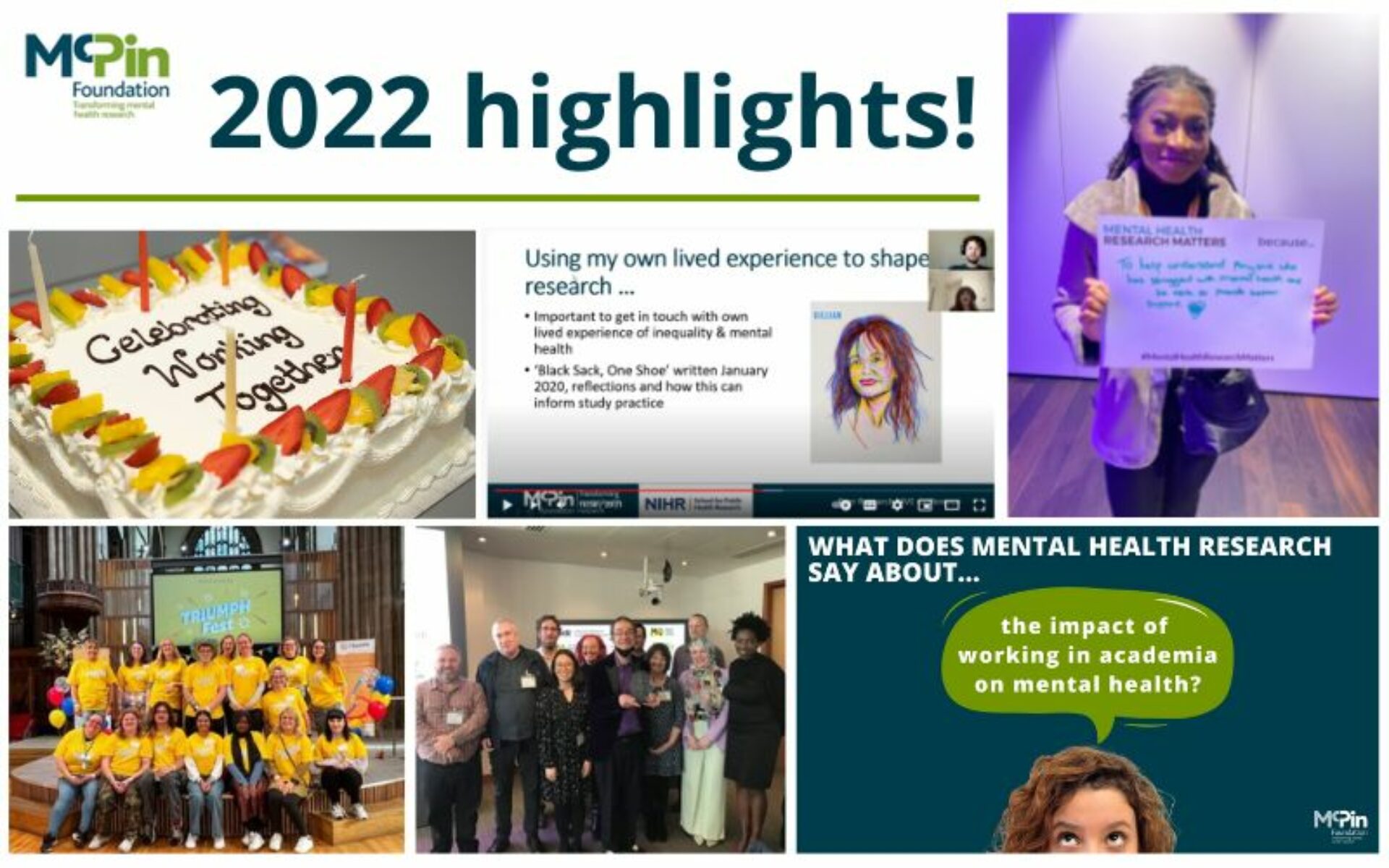As 2022 draws to a close, McPin Research Director Vanessa shares some of her highlights from the last year, and some things she’s excited about for the next.
Vanessa Pinfold
We are looking back on another busy year at McPin and firstly I want to thank everyone who has worked with us to deliver a range of projects and activities as we emerge from Covid-19 into a cost-of-living crisis.
There are so many current pressures, with mental health impacted in both small and very significant ways up and down the UK. Looking out for each other is crucial, at this time of year and always.
At McPin we do have a gap between our ambitions and current progress to transform mental health research, although this year saw the launch of our first ever campaign #MentalHealthResearchMatters digging deeper into this conversation, and we are emerging raring to go to drive change.
If you missed this please do explore the campaign website and our four key themes – inclusive research, multi-disciplinary teams, centering lived experience and partnerships.
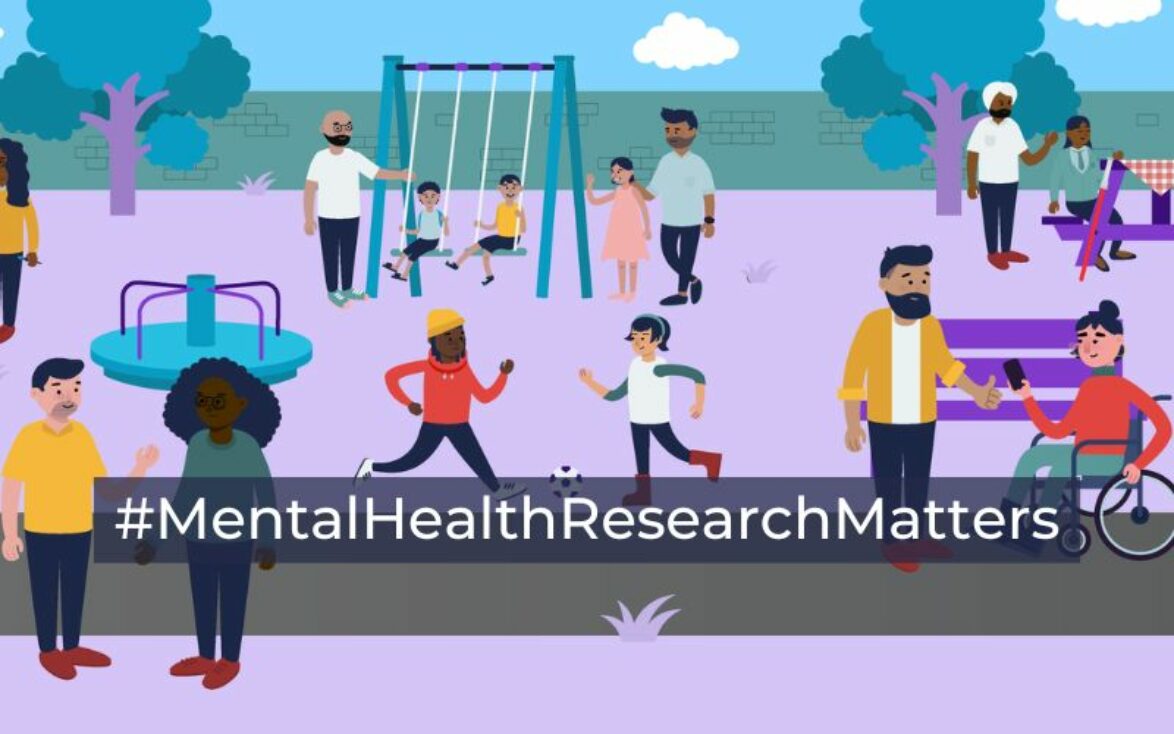
In terms of behind-the-scenes logistics, this year has been about planning for change – new website, new strategy – and hybrid working was here to stay, so needed to be embedded and supported.
It has also been about development: our mentors programme, diversifying group membership, working with new partners, and delivering training. Here are a few highlights.
Building peer research credentials
In academic circles, peer review papers are very important and part of career progression. At McPin they are important for building a solid knowledge base and ‘how to’ explorations for experts by experience in research roles.
Peer review papers are always tricky projects and, for us, the time it takes to write them and the collaborative way we work can make this even harder. However, in 2022 we have some notable successes, publishing papers that demonstrate the use of peer research methods.
Take our collective approach to writing about the evolution of peer support values, integrating data from projects and reflections from peer researchers working across three studies.
A life more ordinary was written based upon work by two pairs of peer researchers, and follows the development of a new support for people with psychosis, known as Feeling Safe. This paper documents carefully the analysis process from six interviews and suggests:
A peer research approach can be used to explore the experience of participating in psycho-logical therapy, providing a distinct perspective that enriches the data collected by drawing on additional lived experience knowledge.
There is more to come in 2023 including a series of 10 in-house publications as part of a series we are calling ‘ten-for-ten’ to mark the 10-year anniversary of the McPin Foundation.
Within that collection will be a peer research resource, a resource exploring using lived experience in the workplace, reflections on working as young people co-researchers, and much more.
Young people’s mental health
Our young people’s programme continues to develop with consultancy projects helping early career researchers to fine tune proposals before submission to funders, and longer-term partnerships such as with the University of Birmingham.
In 2022 we joined forces with the Youth Advisory Group (YAG) at the Institute of Mental Health in Birmingham and have brought our heads together to share learning.
We have a larger young people’s advisory group now, having merged two panels into one and held our first face-to-face meeting in three years in early December 2022. The energy, commitment and ideas of young people were on show at the TRIUMPH festival in Edinburgh, which is a personal highlight of the year for me.
I got to meet lots of fantastic people, learning about projects from organizations across the UK, and work closely with some members of McPin YPAG, including Hemlata who summarized the weekend in a blog post.
We have projects on self-harm and suicide, seeking help through GPs, surveying the view of LGBTQT+ young people, and sleep and mental health – so quite a diversity of topics.
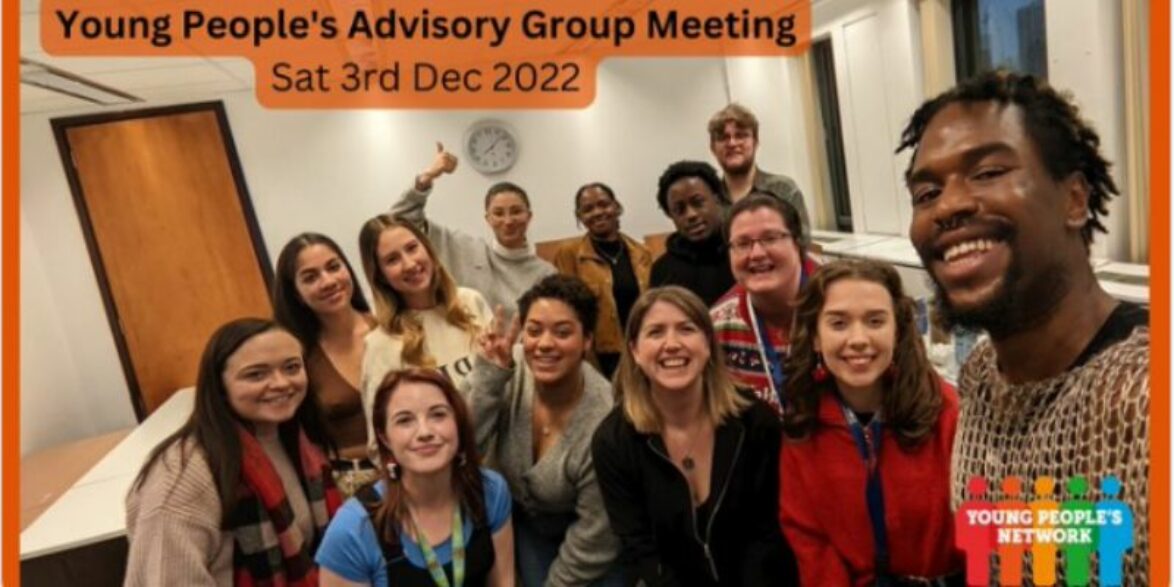
Working in partnership
Our work is built upon collaborations with other organizations such as the University of Oxford, University of Plymouth and voluntary organizations such as Black Thrive Global and the Samaritans.
On the hottest day of the year I got to go to Harrow on the Hill in London to a meeting hosted by Harrow Association of Somali Voluntary Organisations (HASVO), a charity dedicated to supporting ethnic minority residents in Harrow.
We were celebrating partnership working on a study exploring the co-location of specialist mental health support in community spaces, with knowledge-sharing and cake. It was inspiring and grounding to witness research that was making an active contribution to community development.
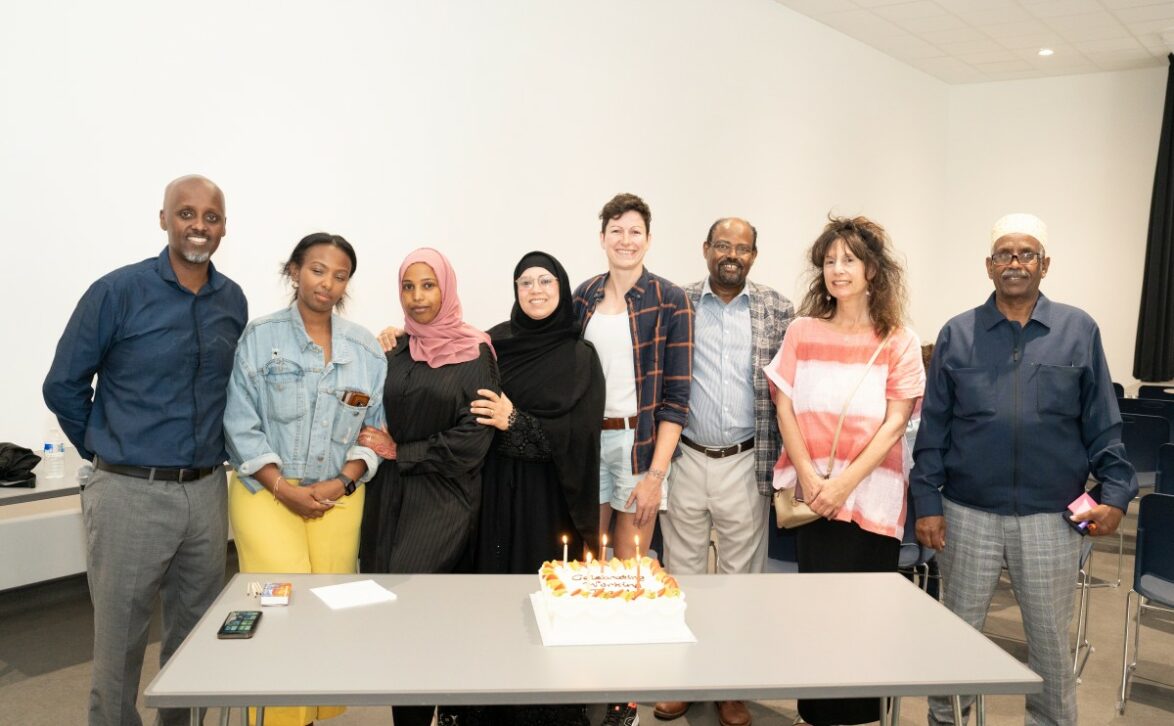
For tips on successful collaborations see Gillian’s blog or catch up on the recent webinars we ran in our campaign with speakers from ASH, Campaign to End Loneliness, Helen Bamber Foundation, the SMaRteN network and more.
Another example of partnership working in 2022 was with East London NHS Foundation Trust where they hosted a McPin researcher in residence to help evaluate the community mental health transformation programme.
We learnt a lot, and I hope they did too. This policy programme led by NHS England (NHSE) is about place-based mental health care, re-imaging the offers from secondary care, primary care, social care and the voluntary sector to provide joined-up holistic, timely and appropriate support to anyone in need of mental health care.
Sticking with NHSE, we also delivered an evaluation of a pilot maternal mental health service in London working closely with NHSE delivery staff.
We are planning outputs from these pieces of work in 2023, and this is important as both are vital service development activities with lessons that translate to other settings.
Partnerships working can be very rewarding and we are lucky to work with so many amazing organizations and individuals within them.
Winning prizes can also be vitalizing and important for teams – which we saw this year through the NEON project led from University of Nottingham with McPin as a partner – when it won an award for high quality public involvement, giving recognition to its public advisors. Well done NEON!
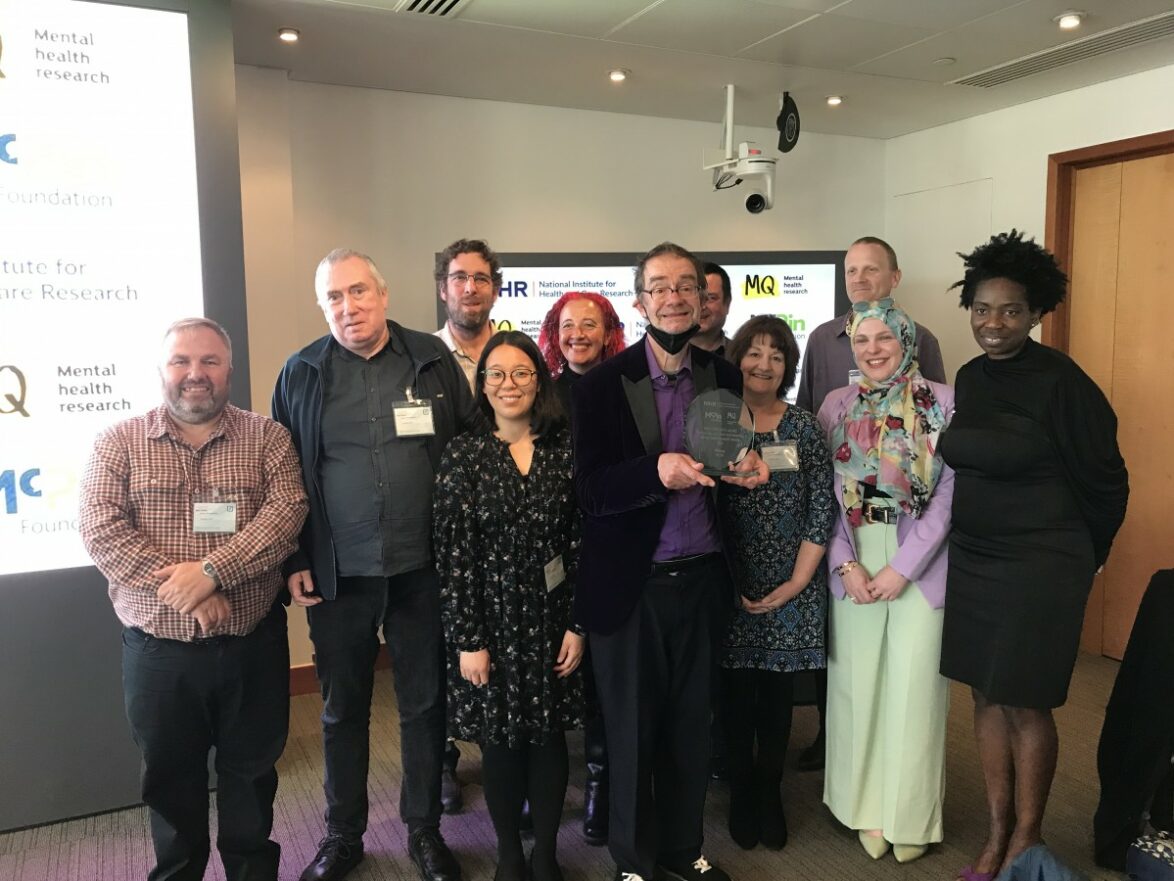
Looking forward to 2023
In 2023 we will be looking backwards in order to go forwards, celebrating 10 years as a mental health research charity – with resources produced by staff and collaborators based on our experiences of centering lived experience expertise!
We will be working with Do it Now Now on our diversity equity and inclusion (DEI) programme.
We are also looking forward to building on the progress made in 2022 with our young people’s work.
Driving changes in policy and practice requires strong collaborations and partnerships. We will continue to build on our campaign #MentalHealthResearchMatters which harnessed cross-sector interest and support, and aim to grow out network.
Get in touch if you’d like to collaborate. And do look out for our new website – coming soon!
Best wishes from all of us for the festive season and into the New Year.
Vanessa Pinfold is Research Director at McPin
